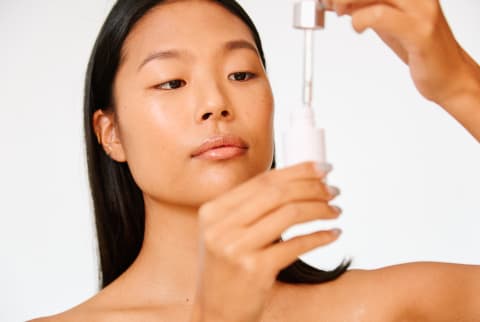Advertisement
Bakuchiol Oil vs. Retinol: Which One's Better? Our Guide To Finding The Right One For You


For so long retinol reigned as the champion skin care item for dermatologists everywhere. The vitamin A derivative was hailed as the "gold standard" for acne and aging skin concerns. Experts cited its ability to encourage skin cell turnover, enhance collagen production, and repair damaged skin cells via regeneration.
And while scores of great ingredients out there help the skin in many other useful ways—derms claimed that none held a candle to retinoic acid's scientific literature and efficacy.
But then a botanical active called bakuchiol became "trendy"—the ingredient has been around for a long time, actually—and soon natural-leaning and clean brands were purporting its retinol-like properties.
Bakuchiol is a type of antioxidant compound called a meroterpene phenol1, and it's most abundantly found in the seeds and leaves of the babchi plant (Psoralea corylifolia), which is native to India and has a long history of use in the area.
For topical use, the benefits include smoother skin texture, reduced oxidative stress markers, fewer fine lines, and less discoloration or fewer dark spots.
But what is the most effective—or rather, which one is right for you? Well, that's what board-certified dermatologist and mindbodygreen Collective member Whitney Bowe, M.D., shared in a recent TikTok video comparing the two.
Bakuchiol vs. Retinol: What does the research say?
The short answer is this: There's absolutely credence to its moniker as the "natural alternative to retinol"—but more comparative studies need to be done, as well as larger studies on bakuchiol's optimal concentration, usage, and mechanisms.
"Between bakuchiol and retinol, what is better for hyperpigmentation and wrinkles? There is one study—and it's a good study—that shows if you use bakuchiol once a day and use retinol once a day for three months, you can actually see comparable results between the two groups," says Bowe. "But that's only one study."
In fact, the study she's referencing said this: In one 12-week, double-blind study, half of the participants were assigned to use a topical treatment containing 0.5% retinol at night, and the other half were assigned to use one containing 0.5% bakuchiol twice daily. Researchers found that both groups experienced significant but equal improvements in lines, wrinkles, pigmentation, elasticity, and skin firmness with an overall reduction in photo-aging. The bakuchiol group, however, experienced less dryness, scaling, and irritation—and most notably didn't have photosensitivity, which made the twice-daily use appropriate.
And as board-certified dermatologist Keira Barr, M.D., previously told us, "Although it has no structural resemblance to retinoids, bakuchiol has been shown to function similarly to traditional retinols by targeting1 similar cellular pathways—activating signals that play a role in the skin's ability to combat oxidative stress2, fight free radicals, and reduce dark spots. This results in skin with a smoother texture, less hyperpigmentation, improved elasticity, and fewer wrinkles."
Which one is right for you?
Listen: Retinol, retinoids, and retinoic acid still hold the lion's share of research—but that doesn't necessarily mean it's the right choice for you. But if you're looking for a little guidance, here's our best advice. But ultimately, it's whatever you find works best for your skin.
- Acne: Retinol. While bakuchiol may help with acne—it has anti-inflammatory and antibacterial properties3—it has not been studied as an acne treatment. Retinol, on the other hand, has loads of data pointing to its ability to treat acne4, especially moderate to severe cases.
- Hyperpigmentation, fine lines, and wrinkles: Either. Per the section above, both options have been shown to be effective treatments for these concerns when used correctly. Look for options with around 0.5% concentrations—and only use retinol at night, while you should use bakuchiol twice daily for best results.
- For prescription-strength treatments: Retinoid. For concentrated, high-power doses, you can go to your derm for a prescription-strength version. (Retinol is the over-the-counter variety, while retinoids include Retin-A as well as its generic counterpart Tretinoin.) Since these are much stronger, please follow your dermatologist's instructions closely.
- Sensitive skin: Bakuchiol. Many people cannot tolerate retinol or retinoids due to easily irritated skin. The available research suggests that bakuchiol does not have this same problem and thus is a better option for this group of people.
- If you are pregnant or breastfeeding: Bakuchiol. Dermatologists don't recommend using retinoids of any kind when you are pregnant and breastfeeding out of an abundance of caution. However, bakuchiol is considered safe.
Finally, don't feel the pressure to use either! I know so many people who feel they need to get on the retinol or bakuchiol train or else they're missing out on the Fountain of Youth. But rest assured there are plenty of great skin care ingredients out there that can support collagen production, smooth skin, decrease pigmentation, help with acne—the list goes on.
The most important thing is that you find a routine that agrees with your unique skin and that you are consistent.
